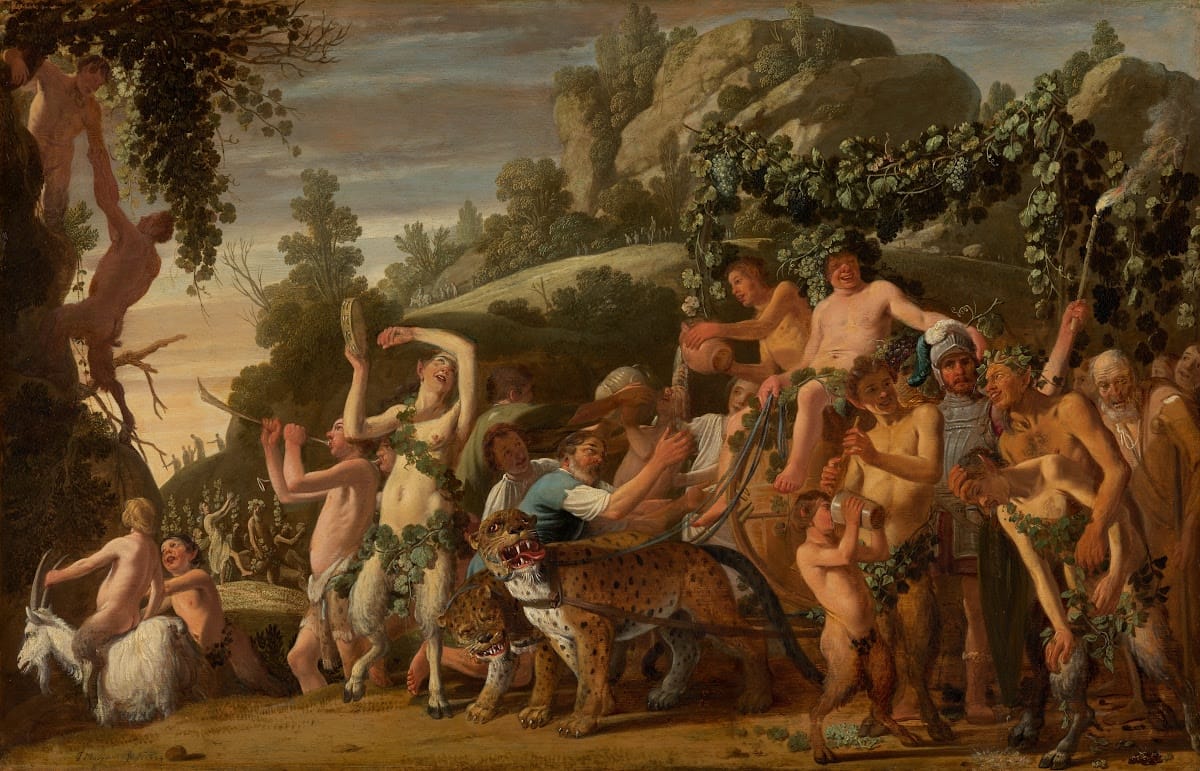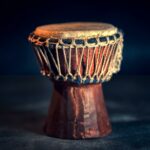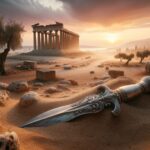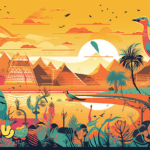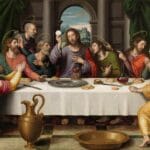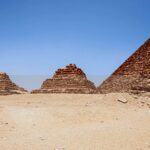Get ready for an amazing trip through the crazy parties, aka the Dionysian festivals, in ancient Greece. These gatherings were all about Dionysus, the god of partying, wine, and theater. We’ll dive into how these festivals started and changed over time—from wild rituals to massive shows in the city. We’ll uncover the secrets of the cult of Dionysus, how it shaped Greek life, and how it still influences our world today. So, let’s pour a glass of wine and lose ourselves in the ecstasy and rituals of the Dionysian festivals!
Festivals of Dionysus
Imagine ancient Greece: a world of gods, epic tales, and iconic architecture. Now, picture a god whose parties were legendary. This is Dionysus, the god of wine, freedom, and pure joy. His festivals were the ultimate blowouts, massive parties with groundbreaking theater and rituals that pushed the boundaries of convention.
These festivals were the Greeks’ way to cut loose. They provided a much-needed escape from the daily grind, a chance to embrace pure, unadulterated fun.
The Big One: City Dionysia
Think of the City Dionysia as the Super Bowl of festivals in Athens. This massive theater festival saw playwrights debuting their newest works, including masterpieces like Aristophanes’ The Birds and Euripides’ The Bacchae. It was a chance for writers to achieve stardom and for audiences to experience groundbreaking theater.
Spring Break: The Anthesteria
The Anthesteria was basically a giant “Welcome Back, Sunshine!” party. Held in spring, it celebrated the new harvest, gave thanks to Dionysus for the gift of wine, and may have even involved remembering those who had passed. This festival was famous for its processions, some too wild to describe here, all in the name of honoring Dionysus and nature’s bounty.
Unleashing the Wild Side
One of the most remarkable things about Dionysian festivals was their ability to allow people to step outside the strict rules of society and just be. They created a space for free expression, uninhibited dancing, and authentic emotional connection. This freedom was actually key to the development of Greek theater, as playwrights used these festivals to explore deep themes of human suffering, justice, and the search for meaning in an entertaining and thought-provoking way.
The Legacy Lives On
The impact of these festivals went way beyond ancient Greece. The very idea of theater as we know it, the exploration of complex emotions on stage, even the concept of a music festival – these all have roots in those wild Dionysian celebrations. Even today, the spirit of Dionysus lives on, inspiring artists, thinkers, and anyone who believes in the power of letting go and embracing the joy of life.
Wondering about the definition of history? Come check out our article about it, it’s more interesting than you might think.
What Holidays Are Associated with Dionysus?
The ancient Greeks didn’t just worship Dionysus quietly. They threw massive, wild parties in his honor! These weren’t your average parties, though. They were festivals brimming with rituals and traditions and were hugely important in ancient Greek life.
Let’s break down the most famous ones:
- Little Dionysia: Don’t let the name fool you, this harvest festival was a big deal in the countryside. It celebrated Dionysus as the god of winemaking, fertility, and new beginnings. Young people might dedicate themselves to Dionysus during this time, like a spiritual coming-of-age.
- Lenaea: This mid-winter festival in Athens was all about drama. They’d have playwriting competitions, performances, and processions all honoring their favorite party god.
- Anthesteria: This festival welcomed new life, growth, and the first blooms of spring. It was a time to honor Dionysus, of course, but probably also Persephone, the goddess of springtime.
- Oschophoria: This joyous celebration of the coming harvest involved a lot of singing, dancing, and something like a parade, but with people hyped about grapes instead of floats.
- City Dionysia: This was the big one, the granddaddy of them all. Also known as the Great Dionysia, this Athens-based festival was like the Super Bowl of Dionysian celebrations, complete with massive processions, actors embodying Dionysus, epic plays, and competitions between Greece’s best playwrights. Winning a prize here was a huge deal!
Each festival was unique, celebrating different facets of Dionysus and what he represented: joy, abundance, release, and the cycle of life, death, and rebirth. And let’s be real, any excuse to drink wine and watch a good play, right?
What Was the Major Dramatic Festival in Honor of Dionysus?
Imagine a festival so grand that it took over Athens every year: the Great Dionysia. This wasn’t just any town fair. This was the event for playwrights to debut their newest works – tragedies, comedies, and satyr plays (think ancient Greek satire, often a bit wild!). It was the Academy Awards, Coachella, and Mardi Gras rolled into one giant, week-long party.
The Great Dionysia provided a chance to let loose, express oneself without judgment, and celebrate Dionysus’s connection to winemaking and nature’s bounty. But this festival’s impact went way beyond those wild celebrations.
The plays performed there weren’t just entertainment; they became some of the most important works of literature in Western civilization. Timeless stories about love, loss, and what it means to be human, these themes still resonate today. Without the Great Dionysia, we might not have the plays of Sophocles, Euripides, and Aristophanes. The festival wasn’t just a party; it was a breeding ground for some of the most powerful and enduring stories ever told.
What Is the Festival of Dionysus Day 3?
Picture the third day of the City Dionysia, the biggest bash of the whole festival. The energy is electric. The city is buzzing because this is the day they celebrate Dionysus’s grand return to Athens.
Dionysus, the ultimate party god, encourages everyone to let loose. He’s all about breaking free from rules and embracing the wild side, which is why he’s often called “the liberator.”
The day begins with a massive parade through the city, led by a giant wooden statue of Dionysus, like a VIP being escorted to the hottest club in town. It’s a party all the way to his temple!
But it’s not just about parades. People perform rituals and make offerings to Dionysus, showing their respect and gratitude. It’s a moment of unity and shared joy, where everyone feels connected through their devotion.
Now, imagine the Colosseum packed with people. That’s what it was like in the Theater of Dionysus on the third day. Playwrights like Euripides and Aristophanes, superstars of their time, would debut their newest masterpieces here.
And these weren’t just your average plays. They were intense: tragedies, comedies, and satyr plays, all exploring the depths of human nature and the struggles we all face. Think of it like binge-watching your favorite show live, but way more intense!
Why was Day 3 such a big deal? It wasn’t just about honoring a god. It was a time to embrace liberation and celebrate the power of art. The theater became a space to escape reality, explore different perspectives, and connect with emotions on a deeper level. It was a reminder that even in a world of rules, there’s always room for joy, creativity, and a little bit of wildness, just like Dionysus himself.
Here’s what made Day 3 so special:
- The City Dionysia’s biggest day: The grand finale, Day 3 marked Dionysus’s epic return to Athens.
- Dionysus the Liberator: This god was all about breaking free from norms and embracing unrestrained joy, temporarily lifting social barriers.
- Drama King: The Theater of Dionysus hosted incredible play competitions with tragedies, comedies, and those quirky satyr plays.
- Art Imitates Life: The plays tackled real human issues, making audiences think, feel, and connect with the characters’ struggles.
What Is the Festival of Dionysus Medea?
Imagine a celebration so wild, so full of life, that it makes modern parties look tame. That’s the Festival of Dionysus Medea.
This wasn’t just another day; it was a massive tribute to Dionysus. If ancient Greece had a rock concert, a theater performance, and a spiritual awakening all rolled into one, this would be it.
This festival allowed people to break free from societal expectations. It was like society hit the pause button on being uptight and embraced chaos. People believed that during this time, the line between humans and gods blurred, bringing them closer to the divine.
The main event was the performance of intense plays. We’re talking legends like Euripides and Sophocles, whose works explored human emotions – love, loss, the search for purpose. These performances weren’t just entertainment; they held a mirror up to society, revealing its hopes, anxieties, and the search for meaning.
Here’s a summary:
- The Festival of Dionysus Medea was a major event in Athens, honouring Dionysus with dramatic performances.
- It wasn’t just about tragedies; they also had comedies.
- Two versions of this festival existed: the Rural Dionysia (starting in Eleutherae) and the City Dionysia (held in Athens every March).
- This festival was also a competition where playwrights battled it out with their best tragedies and comedies, hoping to win prizes.
Are There Any Festivals to Celebrate Dionysus?
The ancient Greeks celebrated Dionysus with the Dionysia – festivals that were far from your average get-together. Imagine a massive party with incredible theater, more wine than you could imagine, and enough dancing to get everyone moving. These festivals were cultural cornerstones!
Dionysus wasn’t just about the good times (though he appreciated those). He represented freedom, release from daily life, and the raw energy of ancient Greek culture.
Curious about the specifics? Let’s explore some of these legendary shindigs:
1. City Dionysia: The Main Event
Picture Athens in springtime, buzzing with excitement for the City Dionysia. Playwrights competed to showcase their greatest tragedies and comedies. Imagine the drama, the intrigue, the standing ovations! It was the ancient Greek Oscars, but with togas and way more wine.
2. Anthesteria: Cheers to the Harvest!
As winter faded, the Greeks celebrated Anthesteria, marking the promise of a bountiful harvest. Anthesteria also had a somber side, honoring those who had passed away. It was a blend of springtime joy and remembrance.
3. Rural Dionysia: Taking the Party to the Countryside
The Rural Dionysia brought the Dionysian spirit to the countryside. These celebrations, probably less polished than their Athenian counterparts, embodied raw, uninhibited energy. Imagine bonfires, dancing under the stars, and laughter echoing through the hills.
4. Lenaia: Unleashing the Wild Side
Lenaia injected joy and chaos into the Greek winter. This festival was all about letting loose, wearing masks and costumes, and embracing the liberating spirit of Dionysus. Some believe it was a time when social norms were reversed, allowing people to express hidden desires.
These festivals weren’t just about having fun (though they excelled at that). They were a fundamental part of ancient Greek society, fostering a connection with their gods, their community, and themselves.
Want to learn more? This is just the tip of the iceberg! There’s so much more to explore about Dionysus and his wild festivals – the myths, the rituals, and their lasting impact. Grab a history book or fire up your search engine and dive into the fascinating world of Dionysus!
Why Is There a Festival in Dionysus’s Honor?
The ancient Greeks took their celebrations seriously, especially when honoring their gods. They threw huge parties, called the Dionysia, to show their appreciation for all things Dionysus.
Let’s Talk About the Party: The Dionysia!
The most famous Dionysian festival was the City Dionysia, held annually in Athens. Picture a city buzzing with excitement as everyone dressed up for the premiere event for new Greek tragedies, comedies, and satyr plays. Playwrights like Sophocles and Euripides, superstars of their time, would debut their works here, competing for glory and the adoration of the crowds.
The showstopper? A giant procession parading a wooden statue of Dionysus through the city, symbolically welcoming him back and kicking off the festivities!
The Anthesteria, another big festival, celebrated the harvest. They’d open barrels of fresh wine, make offerings to their ancestors, and even put on hilarious plays poking fun at marriage. It was a time to relax, enjoy the fruits of their labor, and perhaps indulge in a bit of mischief.
Myths, Legends, and Rituals
These festivals were deeply connected to the myths surrounding Dionysus. Born to Zeus (king of the gods) and the mortal Semele, Dionysus was ripped apart by jealous Titans as a baby and brought back to life.
The Greeks saw this death and rebirth as symbolic of nature’s cycles – the changing seasons, growth, and harvest. They’d reenact it during festivals with rituals and sacrifices, connecting with the divine and finding meaning in the world.
The Dionysus Effect: Shaping a Culture
You can’t discuss Greek culture without mentioning Dionysus and his festivals. They were instrumental in developing Greek drama, providing a stage for history’s greatest playwrights. They fostered a sense of community, relaxing social barriers and allowing everyone to celebrate, enjoy theater, and connect with their spiritual roots. It’s a legacy that resonates even today.
What Is the Dionysian Holiday?
The ancient Greeks celebrated Dionysus with massive festivals called the Dionysia, usually around mid-March. Imagine your entire city transforming into a giant street party, complete with parades, colorful costumes, music, dancing, and of course – wine! It was a true celebration of life, abundance, and letting loose.
The biggest and most important of these Dionysian events was the City Dionysia, held in Athens. People from all over would flock to witness the spectacle, making their way through the crowds to the magnificent Theater of Dionysus, carved into the hillside. This was the place to be, where renowned playwrights like Euripides and Aristophanes premiered their latest masterpieces – groundbreaking tragedies and hilarious comedies.
But the Dionysia wasn’t just about entertainment. Dionysus was also the god of fertility, representing nature’s life-giving power. These festivals involved rituals and processions, some a little “symbolic,” involving, shall we say, phallic imagery. It was all part of asking the gods for a good harvest and ensuring the land’s fertility.
One of the most fascinating things about the Dionysia was its temporary suspension of social norms. For a few glorious days, rules and restrictions were relaxed, allowing people to shed their inhibitions and embrace a sense of freedom and liberation. It was a time to connect with primal instincts, express hidden desires, and celebrate the sheer joy of being alive.
While we might not be parading through the streets with grapevines today, the spirit of Dionysus and his legendary festivals still resonates. Theaters captivate us with stories of human drama and comedy, reminding us of the power of storytelling first explored during those ancient celebrations. So, next time you enjoy a glass of wine or lose yourself in a captivating performance, remember the echoes of the Dionysia and the enduring legacy of the god of wine and revelry.
What Is Associated with Dionysus?
Dionysus, the Greek god of wine and revelry, wasn’t just about having a good time. He represented many important concepts to the ancient Greeks.
The Party Animal of Mount Olympus
First and foremost, Dionysus was all about wine. Greek mythology even credits him with its invention. And where there’s wine, there’s usually a party! The ancient Greeks understood this, throwing massive festivals in Dionysus’s honor that were giant celebrations of life, complete with music, dancing, and of course – lots of wine.
More Than Just a Pretty Vine
But Dionysus wasn’t just about getting tipsy. He was also connected to deeper concepts, like the cycles of nature and the power of the wild. Grapes, the source of wine, grow and change with the seasons, just like everything else in nature. This connection prompted contemplation on life, death, and rebirth – those big questions humans have always pondered.
Unleashing Your Inner Wild Child (Safely, of Course)
Dionysus’s followers were known for their “divine madness.” They’d get caught up in the moment during his festivals, letting loose and connecting with their primal instincts. It was a form of ritualistic release, a way to blow off steam and tap into a raw, primal energy.
The Birth of Drama (No, Not That Kind of Drama)
Ever been to a play? Thank Dionysus! As the patron god of theater, his festivals were the birthplace of Greek drama – those classic tragedies and comedies still admired today. These plays explored themes of love, loss, fate, justice, and everything in between.
Dionysus: A God for the Ages
What can we learn from this party-loving, nature-worshipping, drama-inspiring god? Quite a lot, actually. Dionysus reminds us to embrace life’s joys, connect with our wild side, and never underestimate the power of a good story. Plus, he shows us that even gods love a good party!
What Places Are Associated with Dionysus?
Unlike some gods who stayed on Mount Olympus, Dionysus was a traveler, a god of the people. His presence was felt throughout the ancient Greek world – wherever there was wine, celebration, or a touch of wildness.
Here are some places linked to Dionysus:
- Delphi: Home to the Oracle of Apollo, Delphi was already a significant place. However, it’s believed that Dionysus himself visited, took care of a troublesome serpent named Python, and started his own oracle there.
- Dodona: Another site known for its oracle (this one dedicated to Zeus), even Dodona, with its sacred oak tree whispering Zeus’s secrets, had followers of Dionysus.
- Mount Cithaeron: Located on the border of Attica and Boeotia, this mountain was like Dionysus’s home turf, the place for his mysteries – secret rituals and celebrations central to his worship.
- Thessaly: Known for its connection to magic, Thessaly seems like a natural fit for Dionysus, and he had a large following there.
- Thrace: This wild and untamed region was believed to be Dionysus’s birthplace and a center for his worship. With its rugged beauty and air of freedom, it seems like the perfect origin for the god of liberation and nature’s raw power.
These places offer a glimpse into Dionysus’s world, reminding us that he wasn’t just about wine and parties. He was a complex figure connected to nature, mystery, and the human desire for liberation. Perhaps there are even more places out there whispering his name, just waiting to be discovered.
What Rituals Associated with the Worship of Dionysus Often Included?
The ancient Greeks honored Dionysus with massive festivals called Dionysia, but these went beyond your average party. They involved rituals, performances, and revelry designed to honor the god and experience his power firsthand.
Music and dancing were essential elements of Dionysian worship. Add in plenty of wine (it was his domain, after all), and you can sense the atmosphere. These gatherings were about letting loose, embracing joy, and experiencing the pleasure of being alive.
But there was a deeper side to these celebrations. Animal sacrifices—goats or bulls—were common, offered to gain Dionysus’s favor. To further blur the lines between the human and divine, participants often wore wooden masks representing Dionysus or other mythical figures, adding mystery and transformation to the events.
Sometimes, a masked and decorated pillar, pole, or tree would embody Dionysus’s presence, symbolizing his energy flowing through nature. Sacred feasts featuring bread and wine were also common, symbolizing communion with the god.
One fascinating aspect of Dionysian worship was the “ritual of inversion.” During the festival, social norms were flipped. It was a time to break free from constraints and experience true emotional and psychological freedom.
At their core, these rituals celebrated Dionysus’s connection to the natural world, especially fertility and abundance. People would call upon him for bountiful harvests and the continuation of life itself.
Through music, dance, sacrifice, and ritual, the ancient Greeks sought a deeper connection with Dionysus’s wild, unpredictable energy. They yearned to experience his presence, tap into something bigger than themselves, and perhaps even glimpse the transformative power of the divine.
Key Points about the Festivals of Dionysus:
- Celebrations of Freedom and Joy: These events honored Dionysus, the god of wine, freedom, and joy, offering a way for the Greeks to escape their daily lives and embrace unbridled fun.
- Major Festivals:
- City Dionysia: A massive theater festival in Athens featuring new plays by renowned playwrights.
- Anthesteria: A springtime festival celebrating the harvest and the gift of wine, involving wild processions and rituals.
- Unique Features:
- Freedom of Expression: They encouraged freedom of expression, allowing people to act outside societal norms.
- Development of Theater: They contributed to the development of Greek theater, providing a platform for exploring human themes.
- Lasting Legacy:
- Influence on Arts: The festivals significantly influenced the concept of theater, the exploration of emotions on stage, and the idea of music festivals.
- Enduring Spirit: Dionysus’s spirit of joy and freedom continues to inspire artists, thinkers, and individuals in modern times.
- Senior at What Age: Benefits & Eligibility Guide - March 29, 2025
- Unlocking Senior Benefits: How Old is a Senior? Your Complete Guide - March 29, 2025
- Master Russian Politeness:A Guide to Saying Please - March 29, 2025
